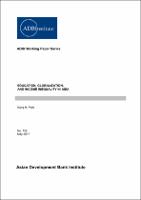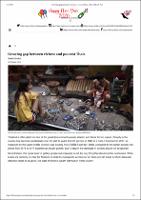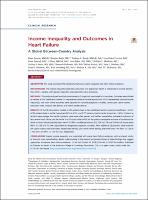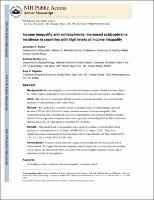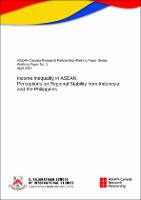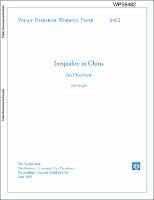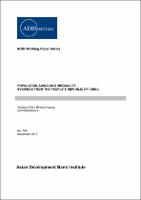Browsing by Subject "Income inequality"
Now showing items 1-7 of 7
-
Education, Globalization, and Income Inequality in Asia
(Asian Development Bank Institute, 2017-05)
This study considers how education and globalization affect income inequality in Asia, with unbalanced panel data. The evidence supports the validity of Kuznets’ inverted-U hypothesis for the connection between income level and income inequality. However, when more variables are integrated into the model, the consistency of the inverse U-shaped curve becomes weaker. The empirical results suggest that educational variables are highly influential in affecting income distribution. Our analysis indicates that a higher level of education achieved by ... -
Growing gap between richest and poorest Thais
(the ASEAN Post, 2019-10-25) -
Income Inequality and Outcomes in Heart Failure
(2019)
OBJECTIVES This study examined the relationship between income inequality and heart failure outcomes. BACKGROUND The income inequality hypothesis postulates that population health is influenced by income distribution within a society, with greater inequality associated with worse outcomes. METHODS This study analyzed heart failure outcomes in 2 large trials conducted in 54 countries. Countries were divided by tertiles of Gini coefficients (where 0% represented absolute income equality and 100% represented absolute income inequality), and heart ... -
Income inequality and schizophrenia: Increased schizophrenia incidence in countries with high levels of income inequality
(2014-03)
Background—Income inequality is associated with numerous negative health outcomes. There is evidence that ecological level socio-environmental factors may increase risk for schizophrenia. Aims—The aim was to investigate whether measures of income inequality are associated with incidence of schizophrenia at the country level. Method—We conducted a systematic review of incidence rates for schizophrenia, reported between 1975 and 2011. For each country, national measures of income inequality (Gini coefficient) along with covariate risk factors for ... -
Income Inequality in ASEAN: Perceptions on Regional Stability from Indonesia and the Philippines
Income inequality has been a growing concern since Global Financial Crisis. But how do regional institutions contribute to the debate on income equality? ASEAN’s normative framework is underpinned by the principle of non-interference while ASEAN has a mandate to establish an equitable economic community post 2015. This study examines if regional income inequality is considered a regional problem, and if so, is the concern significant enough to overcome the principle of non-interference allowing ASEAN to play a greater role in policy formation. ... -
Inequality in China
(Oxford University Press, 2014-10-30)
This paper provides an overview of research on income inequality in China over the period of economic reform. It presents the results of two main sources of evidence on income inequality and, assisted by various decompositions, explains the reasons income inequality has increased rapidly and the Gini coefficient is now almost 0.5. This paper evaluates the degree of income inequality from the perspectives of people’s subjective well-being and government concerns. It poses the following question: has income inequality peaked? It also discusses the ... -
Population Aging and Inequality: Evidence from the People’s Republic of China
Population aging has significant economic and social costs, and this paper studies its impacts on inequality, both theoretically and empirically. First, we build a two-period overlapping-generation model with an uncertain lifetime and find that population aging has the overall effect of increasing income and consumption inequality within the society. For the empirical analysis, we use household data from the China Health and Nutrition Survey to assess the age effect on income and consumption inequality in the People’s Republic of China and confirm ...

